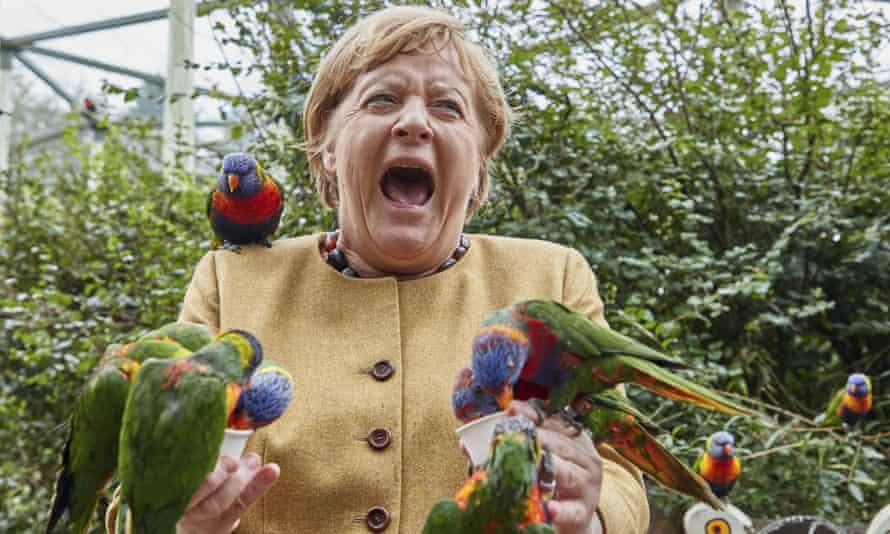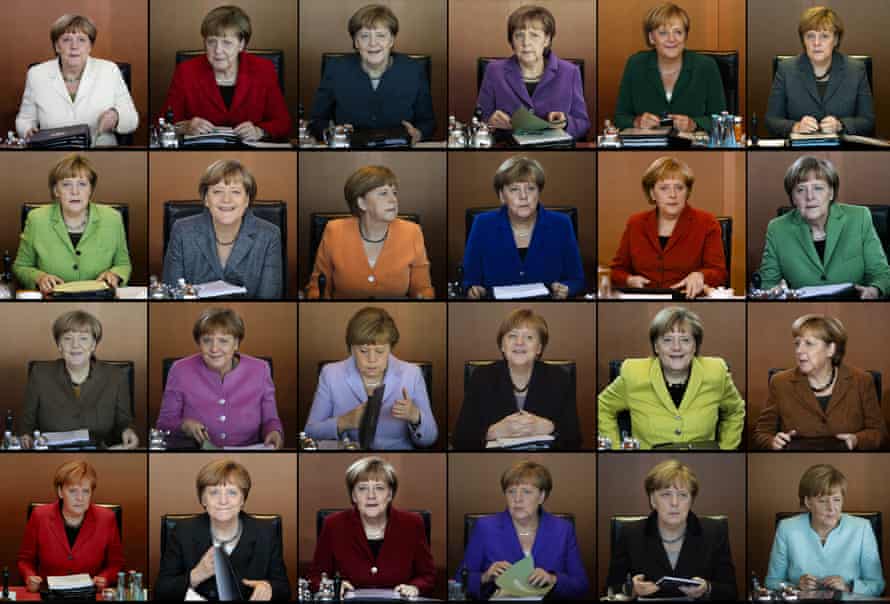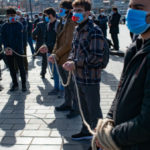The filmmaker and gay rights activist Rosa von Praunheim once confessed that he loved Angela Merkel, but hated her Christian Democratic Union party.
This sense of Merkel as a morally attractive, quasi-presidential figure above petty partisanship is widely shared within Germany and abroad: during the Donald Trump years she was lauded as the last defender of the liberal international order; Boris Johnson described her last week as a “titan” of diplomacy; and even Alexis Tsipras, the hapless leftwing Greek prime minister who was forced by Merkel into years of austerity, cannot help but admire her “sincerity”.
A contrasting narrative of Merkel as an opportunist with no real political convictions but a portrait of Catherine the Great above her desk and a metaphorical dagger underneath to stab male rivals in the back has largely disappeared.
This story was always sexist nonsense. But the apotheosis as the world’s last decent leader is too good to be true: yes, Merkel was successful in keeping her own party, various large coalitions, and the EU together at crucial moments. But she could only do so because, during a boom based on German exports, there was always enough money to buy everyone’s consent. While future historians are likely to marvel at her tactical skills in micropolitics, they may also conclude that she was uniquely placed globally to have done more on the climate emergency – and simply failed to do so.
As Germany’s first female chancellor prepares to step down, Merkelologists have been busy again ruminating about the deeper reasons for her unique style of governing: cautious, oriented towards consensus, pragmatic – the list is by now well known, if not outright cliched.
Might it have something to do with Protestantism (which made her a savvy outsider in a party profoundly shaped by co-founder Konrad Adenauer’s Rhenish Catholicism)? Is it her background as a physicist, predestining her to be the obvious antidote to the world’s science deniers, especially a certain former American president? Or is it all best explained by her upbringing in East Germany, which taught her not to trust too easily and talk as little as possible?
The truth is more banal. Merkel at one point did commit to a bold vision – and almost saw her political career end as a result. In 2005 she campaigned on a neoliberal platform of a flat tax, cuts in the welfare state, and ever more “flexible labour markets”; the federal election was hers to lose to Gerhard Schröder, who was deeply unpopular at that point. And lose she almost did.
That was the beginning of Merkelism as a political method: rather than make yourself vulnerable by prominent programmatic commitments (let alone rousing rhetoric in defence of them), observe carefully in which direction things are going, identify interests that might converge at one point, then occupy that point and claim that you were leading people there all along. She had once wanted to be the German Margaret Thatcher; instead, she decided to be all things to all people.
Tellingly, Merkel was happy to be celebrated at Harvard University as a great liberal promoter of marriage equality when she had actually abstained in the parliamentary vote on same-sex marriage.
She adopted many policies, such as the minimum wage pushed by Social Democrats during the latter’s coalition with the Christian Democrats, and then sold them as her success – thus perfecting the art of what came to be known as “asymmetric demobilisation”: making sure supporters of other parties do not bother to vote, because they have been lulled into a sense that “Mutti” has taken care of everything already. This ecumenical approach was made easier by a kind of windfall profit: Schröder, marching down his very own version of the “third way”, had already implemented tough – critics would rightly say cruel – labour market policies, creating a large low-wage sector. Meanwhile, the euro made German exports cheaper; in combination with high demand from China, this meant golden years with high revenues for the German state, and little reason to make tough choices.
Merkel had once wanted to be a German Margaret Thatcher. Instead she decided to be all things to all people
Merkel never took risks at moments of her own choosing: only crises forced her out of the politics-as-small-scale-problem-solving mode. But even when the house was on fire, she would sometimes wait and see how the mood of local spectators was developing: major Eurocrisis decisions were made with an eye on Landtag elections in Germany itself.
To be fair, crises allowed Merkel to initiate major changes, such as phasing out nuclear power in the wake of the 2011 Fukushima disaster – after having first reversed the decision of the previous Red-Green government to end nuclear, a zigzagging that cost billions of euros.
Not all crises were political bolts out of the blue. Today, leftwingers around the globe treat Merkel as a saint who “opened the borders” for refugees. No doubt, Merkel put a lot on the line in autumn 2015; it was also a rare moment when she explicitly invoked her Christianity to justify why those in dire need had to be welcomed with open arms.

But the crisis had longterm causes, of course: Merkel had for years been fighting against a fairer European asylum system; she had also used the term Flüchtlingsbekämpfung (combat against refugees) which sounded like Schädlingsbekämpfung (pest control) and thus appeared to associate deterring refugees from crossing the Mediterranean with controlling pests.
For the writer Navid Kermani, Merkel’s remark in September 2015 that she had not realised the conflicts in Syria and Iraq could end up affecting the Heimat (homeland) so directly was an astonishing admission. It seemed that she would basically not get worried too much about anything, as long as all stayed quiet on the political home front.
After an acute crisis, Merkel would revert to her “radically reactive governing style”, as one Berlin journalist put it. There was little effort to improve safety or truly to rebuild once huge fires were no longer blazing. The “energy turn” away from nuclear power quickly became an administrative mess.
When the French president Emmanuel Macron, in a grand speech at the Sorbonne in 2017, pleaded with Merkel to build a more coherent EU architecture after the Eurocrisis, Merkel politely ignored him. She half-heartedly tried to find a different European approach to refugees – but then dropped the issue and rested content with paying off the Turkish president, Recep Tayyip Erdoğan, and assorted Libyan warlords to warehouse (or worse) refugees outside the walls of fortress Europe.
Only when the pandemic hit was Merkel again willing to take a daring step – issuing bonds backed by the EU as a whole. What famously made British prime minister Harold Macmillan’s job so difficult – “events, dear boy, events” – were the occasions when Merkel was for once willing to do what she had probably known all along was right, but politically seemed risky unless shrouded in the fog of an immediate crisis.
Merkel’s famous formula Fahren auf Sicht – driving without being able to see too far ahead (let alone having a GPS) – made for safe-enough journeys; but when it comes to the climate emergency, it would probably take the world over the cliff. Or so young German activists have been complaining for years, with Merkel defending herself by patiently explaining that politics consists of “what is possible”.
Her anti-charisma has by now turned into a particular kind of charisma that communicates sincerity
But what is possible has of course also depended on Merkel. After all, she is a scientist with superb analytical abilities to break down large problems into specific policy changes; she had been a minister for the environment in the mid-nineties and her anti-charisma has by now turned into a particular kind of charisma which instantly communicates sincerity (comparable to the effect young Swedish activist Greta Thunberg has on certain audiences). Merkel was thus uniquely well placed to mobilise both national and international publics – but never did.
It turns out there is no such thing as leading from the back on climate.
The limits of Merkelism also became apparent during the pandemic. In spring 2020, the usual narrative about Merkel the rational problem-solver was deployed to explain why Germany had escaped relatively unscathed from the first wave. But by winter, her consensus-seeking style had produced literally fatal delays. Night-long meetings with the heads of the individual federal states about the right policies turned into a cartoonish version of EU summits: bleary-eyed politicians would announce an agreement, only to have it immediately undermined by colleagues who supposedly had shared the consensus. Chaos and confusion resulted.
Merkel’s CDU – a bit like the Tories – has long lived off a nimbus of competence and being the default party of government. The management of the pandemic hurt that image; the long months of lockdown also gave Germans time to contemplate just how far they have fallen behind in infrastructure, education and basically anything to do with the internet; obsessed with balanced budgets, Merkel-led governments simply failed to provide public investment.

Conventional wisdom has it that Merkelism has left her party an intellectually hollow shell. But it’s hard to argue that anybody has really articulated a 21st century vision of Christian democracy anywhere. That is one reason why so many centre-right parties – think of Sebastian Kurz’s People’s party Christian Democrats in Austria – have effectively mainstreamed the far right: without ideas of their own, and no clear sense of where the boundaries between centre-right and the far right should be drawn, nominally mainstream leaders have been busy accommodating nativism or even outright racism in countries such as France and the Netherlands.
In this respect, and to her credit, Merkel did hold it together. She made some remarks about how multiculturalism had “utterly failed” when, a decade ago, it became fashionable to do so. But she also dismissed, with characteristic understatement, a 2010 bestseller that put the fear of being replaced by Muslim invaders into Germans with the words: “not helpful”.
To be sure, her words might have been stronger, and her stance should have been clearer when it came to foreign far-right populists. She was happy to keep the Hungarian prime minister, Viktor Orbán, in the European People’s party, the supranational association of European centre-right and Christian Democratic parties, while the latter was busy hollowing out Hungarian democracy.
The reason is simply that German industry – the powerful car manufacturers in particular – has long been cuddled by Budapest.
Merkel was always more outspoken with Vladimir Putin, and when she first went to Beijing in 2006, she sought to push for “more openness and more freedom”. A year later, she invited the Dalai Lama to the Chancellery. But, as Germany’s dependence on Chinese markets grew, her government turned quieter and quieter; and one of Merkel’s last major initiatives was an EU-China investment pact that pays scant attention to human rights.
Still, even critics will concede her fundamental decency on many occasions. And her fans will remind us that, if nothing else, she is a thoroughly uncorrupt politician; it is hard to imagine her cashing in as a lobbyist or even just on the speaking circuit. Then again, the fact that such self-restraint becomes a matter of moral merit might just show how little we expect from leaders today.
By: Jan-Werner Müller
Jan-Werner Müller teaches politics at Princeton University. His book Democracy Rules was published by Allen Lane in July.
Source: Guardian



